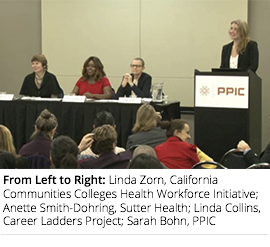Career Tech Credentials in Health Care Can Lead to High Wage Returns According to PPIC Study Funded by ECMC Foundation (2)
December 09, 2016
By Mai P. Tran, ECMC Foundation
There’s good news for students in health care training programs: according to new studies released by the Public Policy Institute of California (PPIC), those who obtain career technical education (CTE) credentials in health care occupations increase their earnings by 50 percent, on average. The earnings, however, vary between specific health programs and type of credential, among other factors.
In recent years, CTE programs in health care have been garnering attention. The rising number of aging Americans who need medical and health services has led to an increased demand for health care professionals as well as repeated calls for the expansion and improvement of their training.
Much, however, has remained unknown about CTE training in health care pathways and its outcomes, such as: how earnings vary by program, which factors improve the likelihood of program completion, how students from traditionally underserved communities perform in comparison to others and more.
ECMC Foundation, along with the Sutton Family Fund, provided PPIC with funding to conduct this study. PPIC used student data provided by the California Community College Chancellor’s Office, collected between 1993 and 2015.
PPIC’s research is culminated in two reports:
Health Training Pathways at California’s Community Colleges, funded by ECMC Foundation and the Sutton Family Fund, examined the likelihood that students with shorter-term health credentials would return to school to earn a higher-level credential. Results show that few students—less than 13 percent—do, and that factors such as full-time attendance and access to financial aid have a significant effect on this. Read the Health Training Pathways report.
Career Technical Education in Health: An Overview of Student Success at California’s Community Colleges, funded by the Sutton Family Fund, found that earnings vary by the type of credential earned: students who have associate degrees earn more than those who graduate from certificate programs, and longer-term certificate program graduates earn more than graduates from shorter-term certificate programs. Completion rates and transfer rates can vary between programs. The study also found an achievement gap among white and African American students, and to a lesser extent, Latino students. These differences, however, are largely explained by other factors such as academic preparation, access to financial aid, and course-taking behavior (whether a student is full-time and/or enrolled in consecutive fall/spring terms). Read the Career Technical Education in Health report.
Both studies suggest that increasing support for students, especially those from underserved backgrounds, is critical for their success. Such efforts can include: increasing financial aid to students in-need, providing additional course sections that allow flexible scheduling and increasing academic support.
Both PPIC reports were released at a launch event on December 1 at the Capitol Event Center in Sacramento. The event included a presentation of PPIC’s findings and an expert panel discussion on California’s community colleges’ role in providing health training pathways.
Did you enjoy this grantee spotlight? Read more grantee spotlights here.
